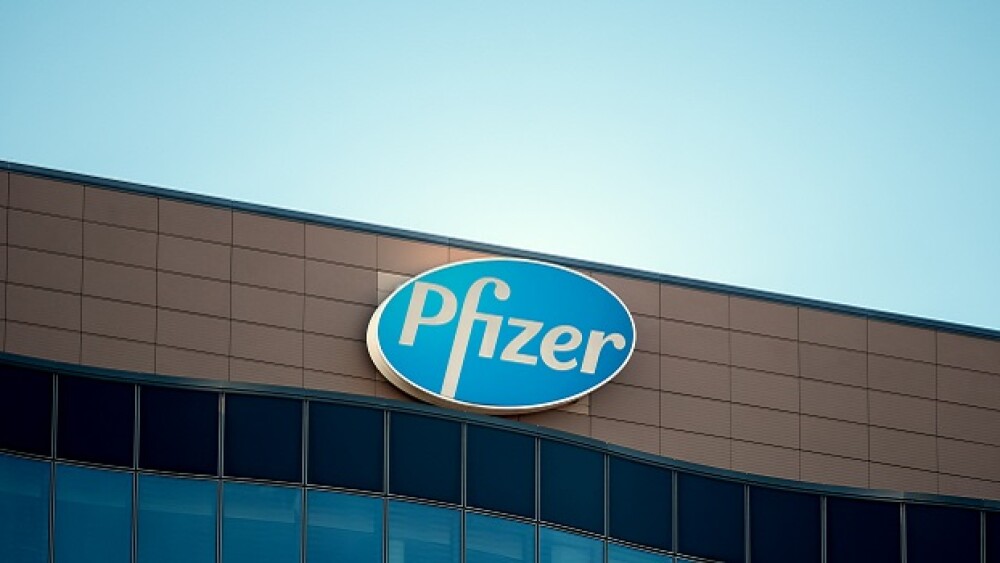The company’s aztreonam-avibactam matched the cure rate of a meropenem-based regimen in patients with drug-resistant infections.
Pictured: Blue and white Pfizer sign on building/cbies/Adobe Stock
Data from the Phase III REVISIT and ASSEMBLE studies showed that Pfizer’s investigational antibiotic combination aztreonam-avibactam could safely cure infections caused by Gram-negative bacteria, the company announced Thursday.
Pfizer and AbbVie are jointly developing aztreonam-avibactam (ATM-AVI), which is supported by public-private partnerships between Pfizer and the Biomedical Advanced Research and Development Authority. Pfizer holds global commercial rights to ATM-AVI, while AbbVie owns these rights in the U.S. and Canada.
These findings from REVISIT and ASSEMBLE position ATM-AVI as an “important treatment option for patients with life-threatening bacterial infections that are resistant to almost all currently available antibiotics,” James Rusnak, senior vice president and chief development officer, Internal Medicine, Anti-Infectives and Hospital, Pfizer, said in a statement.
Enrolling from regions with suspected multi-drug resistant pathogens and with endemic or emerging carbapenem resistance, REVISIT enrolled 422 adults hospitalized for complicated intra-abdominal infections (cIAI), hospital-acquired pneumonia (HAP) and ventilator-associated pneumonia (VAP). ATM-AVI was administered with or without metronidazole.
The ATM-AVI regimen had a cure rate of 76.4% for cIAI patients compared to 74.0% in those treated with meropenem with or without colistin. For HAP and VAP, the ATM-AVI and meropenem regimens had corresponding cure rates of 45.9% and 41.7%, respectively. ATM-AVI showed better cure rates in both cases, but its treatment effect did not reach statistical significance.
Regarding safety, REVISIT found ATM-AVI to be well tolerated, and serious adverse events were balanced between the treatment and control groups. Its side effects were consistent with what had previously been established for aztreonam alone. No serious toxicities were attributed to the study treatment.
ASSEMBLE further confirmed these findings, which enrolled patients hospitalized for metallo-β-lactamases-producing Gram-negative bacteria. The ATM-AVI regimen cured 41.7% of treated patients, while none of those on the best available therapy were cured.
With data from REVISIT and ASSEMBLE, Pfizer will make a regulatory filing with the FDA in the second half of 2023. The company will also submit complete findings and analyses of these studies for scientific publication.
Biopharma Stands Against AMR
Antimicrobial resistance (AMR) is among the world’s most pressing global health threats, according to the World Health Organization. While resistance is a natural phenomenon, the misuse and overuse of these drugs have accelerated this process, rendering more and more antibiotics ineffective.
At the World Vaccine Congress last April 2023, industry leaders pointed to vaccination as a potential solution to the AMR problem.
“Vaccines can prevent or reduce life-threatening diseases and decrease health care costs,” AMR specialist Francesca Micoli, director of Innovation Academy for Global Health, GSK, told BioSpace after a panel at the World Vaccine Congress. Immunization can also ease residual health consequences following an infection.
Beyond vaccines, Micoli said that the fight against AMR should include a holistic strategy, including new interventions to target multi-drug resistant pathogens.
In July 2022, three European companies banded together with the same goal. Boehringer Ingelheim, Evotec SE and bioMérieux created a new company, Aurobac Therapeutics SAS, to advance the next generation of antimicrobial agents and create diagnostic products for more appropriate medication. With the backing of these three companies, Aurobac launched with around $40.7 million to develop a precision approach against AMR.
Tristan Manalac is an independent science writer based in metro Manila, Philippines. He can be reached at tristan@tristanmanalac.com or tristan.manalac@biospace.com.






